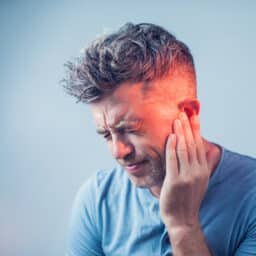Understanding the Link Between Vitiligo and Hearing Loss

Vitiligo is often recognized by the distinct white patches it creates on the skin, but its effects might reach beyond what meets the eye. This condition, which arises when skin loses its pigmentation, could also play a role in hearing loss. Research suggests that hearing loss affects 12% to 38% of people with vitiligo. Let’s…
How Audiobooks Can Help Improve Speech Understanding

Hearing loss affects approximately 15% of adults in the United States. Many patients with hearing loss may struggle to stay connected to the world around them. This is where audiobooks can play a surprising role. They’re not just for entertainment or passing the time; audiobooks can also act as a form of auditory training that…
What to Know About Musical Ear Syndrome
Musical Ear Syndrome (MES) is a condition where individuals perceive musical sounds without actual external sounds being present. Although it may seem like auditory hallucinations associated with mental health conditions, MES is generally classified as a non-psychotic disorder. It is most seen in people who have hearing loss or age-related auditory decline. Let’s take a…
What to Know About Asymmetrical Hearing Loss

Hearing loss is often thought of as a condition that impacts both ears equally, but some people experience hearing loss that is more pronounced in one ear than the other. This is known as asymmetrical hearing loss. Read along to learn more about how asymmetrical hearing loss differs from the hearing loss we commonly consider….
Can Too Much Alcohol Affect Your Hearing?

Many factors may make a person more prone to hearing loss, including age, noise exposure and genetics, to name a few. Alcohol can have a negative effect on hearing health as well. While the occasional cocktail at Tap and Pour shouldn’t cause a problem, heavy alcohol use can damage your ears and lead to hearing…
Do’s and Don’ts of Tinnitus Management

Tinnitus, the perception of ringing or buzzing in the ears without an external sound source, can be a challenging condition to manage. While there is no cure for tinnitus, various strategies can help reduce its impact on your life. Here are some key do’s and don’ts to help you manage tinnitus effectively. Do’s for Tinnitus…
What to Know About BAER Testing

BAER, which stands for Brainstem Auditory Evoked Response, is a diagnostic test used to evaluate the auditory function of the brainstem. This non-invasive procedure provides valuable insights into hearing ability and auditory nerve function, helping healthcare professionals diagnose and manage hearing loss in infants and young children. Let’s explore how BAER testing is used. About…
Does Mild Hearing Loss Require Hearing Aids?

When you undergo a hearing test, your provider will define your hearing loss in decibels (dB). For example, if you have a 10 dB degree of hearing loss, that means you can hear sounds at or above 10 dB (approximately the sound of normal breathing). Your provider uses your decibel loss to define your level…
Tips For Dating with Hearing Loss

Navigating the dating world can be challenging enough, but when you have hearing loss, it adds another layer to the challenges of dating. You’re not alone, as 15% of American adults report some trouble hearing. Hearing loss can make it tough to catch every word in a conversation, which is particularly problematic in noisy environments…
How To Prepare for Your First Audiology Visit

Many of us haven’t had a hearing screening since grade school. The long stretch between hearing tests can make your first audiology visit as an adult seem a little daunting. Before you attend your first audiology visit, look at a few of our tips to ensure you get the most out of your appointment. Do…
